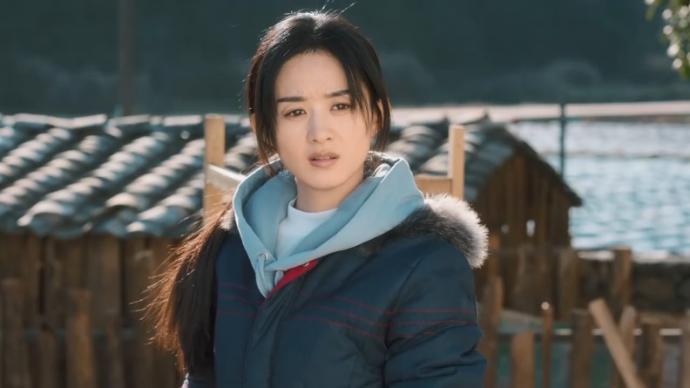
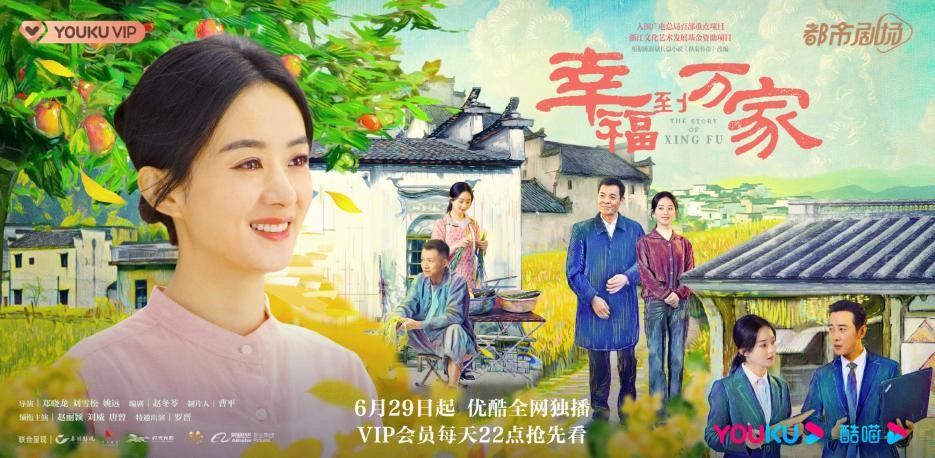
"Happiness to Ten Thousand Homes" poster
On the one hand, "Happiness to Ten Thousand Families" retains, but also very well inherits the film "Qiu Ju's Lawsuit" to reveal the complexity of rural China. Although this line has some dramatic exaggerations, it is quite "realistic". The author has more than 10 years of rural life experience, and everything in the play seems familiar. On the other hand, it depicts the growth of a new rural woman who is different from Qiu Ju, which has caused a lot of controversy. How to think about He Xingfu not getting divorced directly affects our evaluation of this drama.Presenting the complexity of rural China
The background of the story of "Happiness to Ten Thousand Homes" has changed, and the beginning of the play is 2009. There is also a large amount of space expansion between TV shows and movies. Before the village party secretary Wan Shantang (played by Liu Wei) kicked the lower body of Wang Qinglai (played by Tang Zeng), the husband of He Xingfu (played by Zhao Liying) (this is the core conflict in the movie), two conflicts have been set up in the series: Marriage conflict, land acquisition conflict. In these two conflicts, He Xingfu had to say something many times.
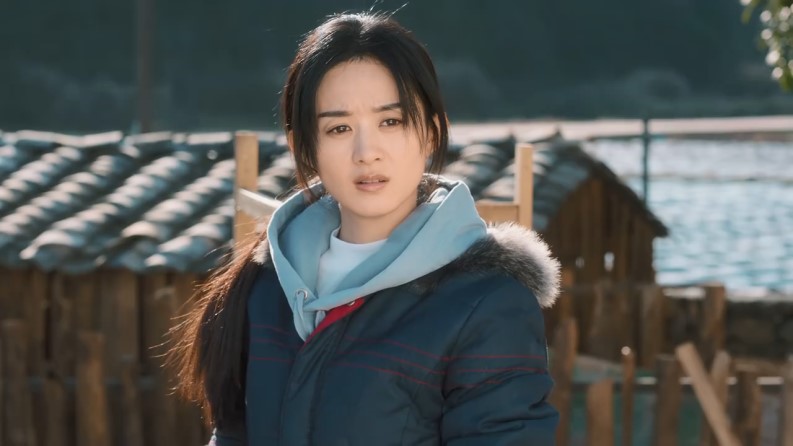
He Xingfu (played by Zhao Liying)
The process of He Xingfu's multiple speeches vividly reflects the huge power of clans in rural society and the deep-rooted concept of human feelings. Especially the complexity of the village party secretary Wanshantang was written out.The surname Wan is the surname of Wanjiazhuang, and the power is the most powerful in Wanjiazhuang. Wanshantang is also a man of merit in the village. He took the whole village out of poverty and became rich. Now he is the chairman of Wanjia Group, and the village is very large. Some people work in the group and rely on him for food. Of course he became the "talker" and "elder" of the village.
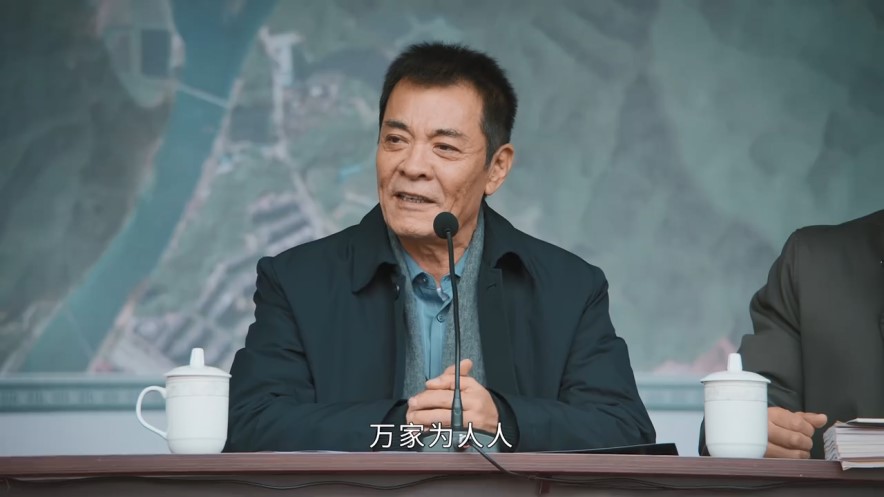
Village Party Secretary Wan Shantang (played by Liu Wei)
This is the norm in many rural areas. Under the combined effect of factors such as clan power and distribution of interests, there will be one or several highly respected "talkers". So at the beginning of "Happiness to Ten Thousand Homes", Wang Qinglai and He Xingfu's wedding, parents have to wait for Wanshantang to come before the ceremony begins.The "talker" is usually responsible for handling and mediating the distribution of interests and disputes in the village, large and small. He must look fair, just, and level. Many conflicts were resolved.
Many times, Wanshantang is also like a reasonable person. For example, his son Wan Chuanjia (played by Cao Zheng) "played a hooligan" in the name of marriage, and molested He Xingfu's sister, He Lucky (played by Zhang Keying). Wanshantang protects the calf again, and knows that Wan Chuanjia has done something wrong, and wants his son to apologize; if his son does not apologize, he finally posted a notice in the village, demanding that future weddings be avoided.
Another example is the subsequent land acquisition turmoil. He Xingfu’s family invested more than 70,000 yuan in greenhouse planting without invoices. Wan Chuanjia did not reimburse them at first.
If you say that Wanshantang does this because it "understands the law", it is definitely not; if you say it is "reasonable", you are only half right. The fundamental reason he did this was to "maintain authority". He must avoid anything that challenges his authority and damages his authority. If there is something wrong with him, he will go down the slope to show that Wanshantang is reasonable and has no favoritism. Otherwise, the sincere support of the villagers will be lost, and the stability of his position will be damaged. For example, he would criticize Wan Chuanjia in front of the management of the group. It seemed that he was not giving his son face, but he was actually helping his son. He knew that only by convincing the villagers could he control the villagers.
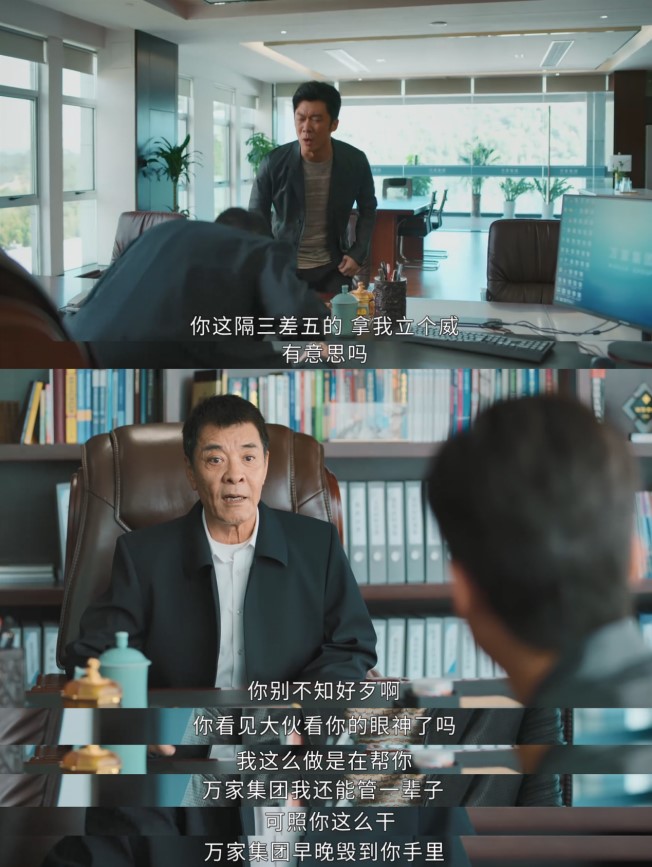
Wanshantang understands the "art of controlling people"
But at some point, Wanshantang will still reveal his true colors - he is essentially the "earth emperor" of Wanjiazhuang, and he is used to being strong. In a particularly interesting scene, he criticized his son at the convention for "not being able to do whatever he wants". Wan Chuanjia retorted on the spot, "Then you don't have the final say in everything," and his son asked everyone present to vote. Wan Shan Tang roared unequivocally, "No need, this matter is settled."You see, how he criticized his son, he actually did it himself.
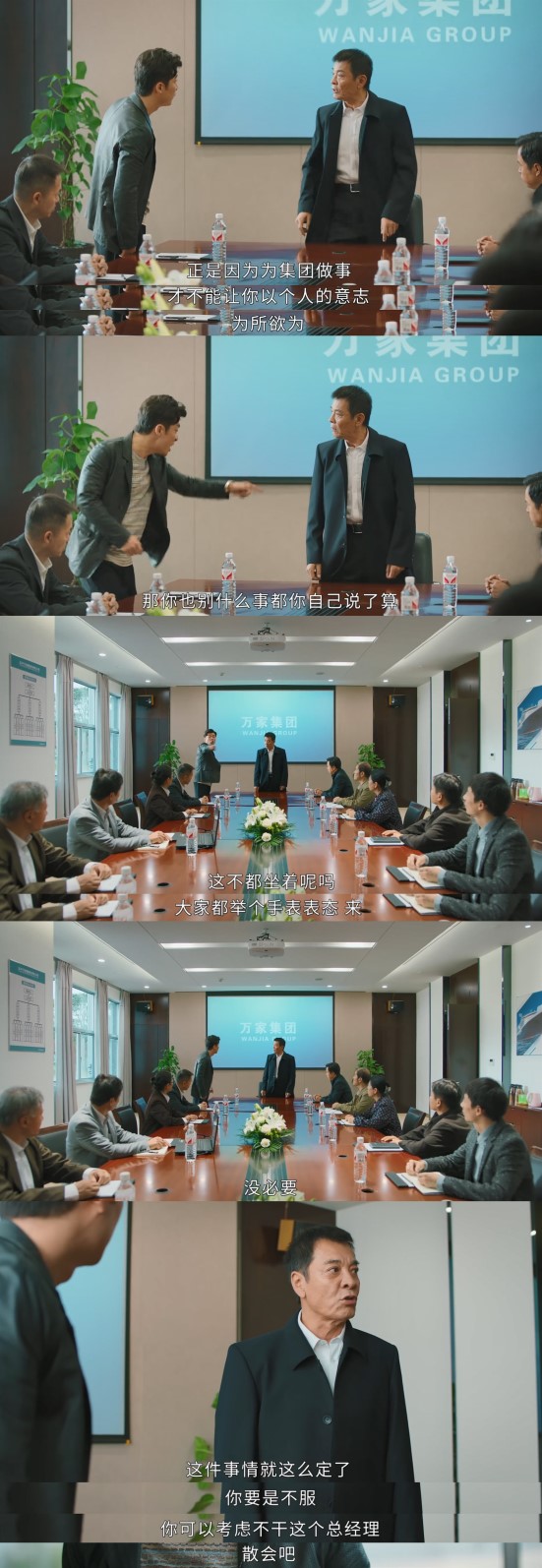
Let the son not do whatever he wants, and he does whatever he wants
If Wanshantang has already made concessions and given face, and the other party still refuses to forgive, then he will be unreasonable, and will use "earth methods" to suppress you with identity and power. When Wang Qinglai talked to him about land acquisition compensation again, Wanshantang, who had lost patience, was no different from a rogue. He said this to the Wang family, "I don't want any face for the sake of money".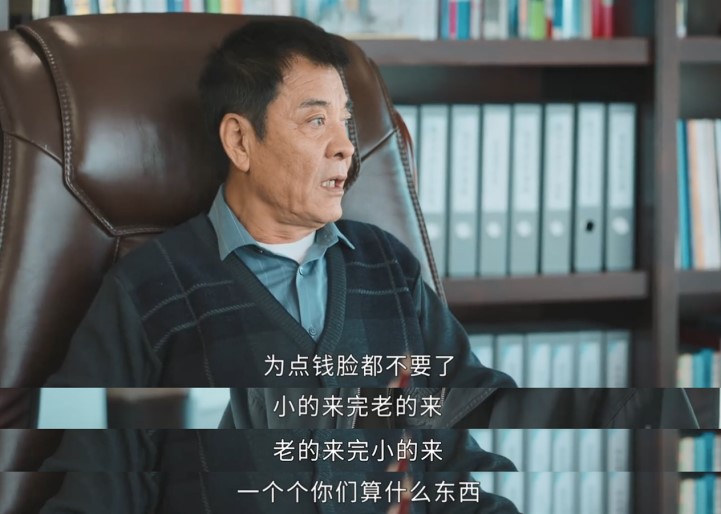
Wanshantang is "high above" after all
In the countryside, "face" is very important. If he gives face, you have to ask for face. Therefore, whether it is Wanshantang or Wan Chuanjia, when they get angry, they are "give you face" and "don't shame your face". Not wanting the face he gave is tantamount to denying his authority.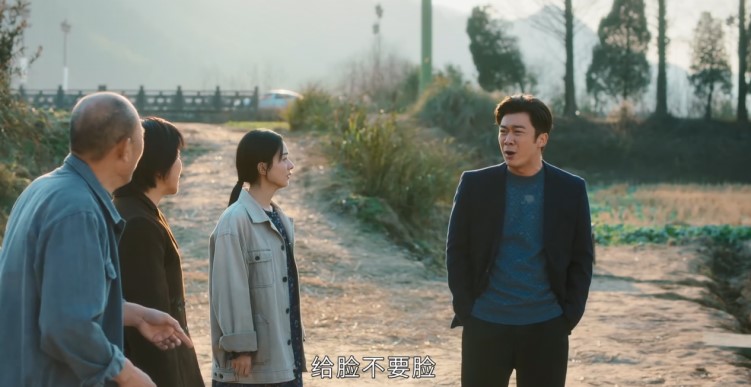
Wan Chuanjia is also aloof, always "give you a face"
This is the general form of rural China: the rule of law is often absent (the police and judges in the town in the play all adopt a sloppy attitude on the grounds that "this is in the countryside"). The authority of man" maintains inertia. "Talking about people" is not the incarnation of "law" or "principle". It is the incarnation of a stable order that has been formed in the countryside. But once you unfortunately become that "price" (on the grounds that collective interests outweigh individual interests), then you can only be sacrificed.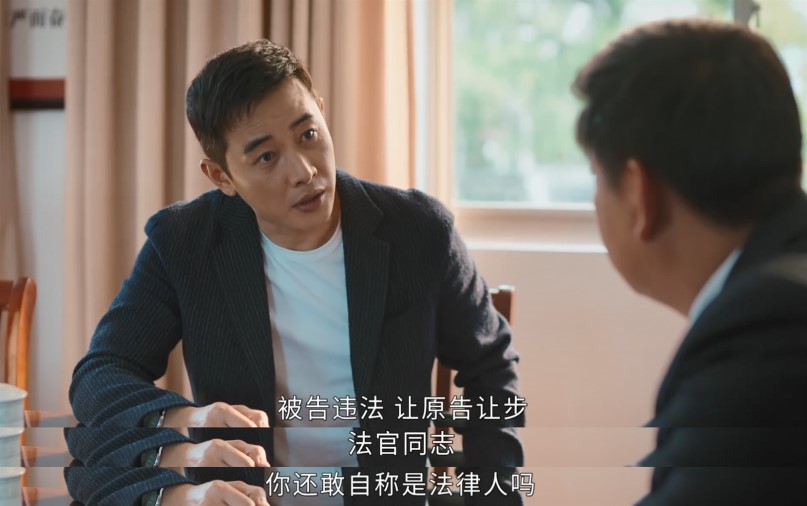
Guan Tao (Luo Jin), a lawyer hired by He Xingfu, "criticizes" the judge
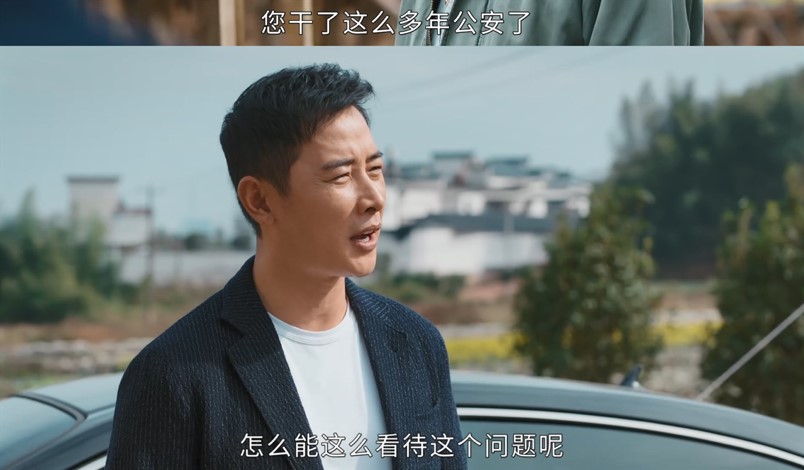
Guan Tao "criticism" and the muddy husband security
He Xingfu became a spoiler. When she arrived at Wanjiazhuang, she just wanted to let Wanjiazhuang "reason" and let Wanjiazhuang "understand the law". This constitutes the first main line of the series, which is a game process in which the rule of law overcomes human feelings.Showing the arduousness of women breaking free from shackles
The process of He Xingfu's speech is also her growth process. On this line, "Happiness to Ten Thousand Homes" faces a lot of controversy.
Some people think that He Xingfu is quite "feudal" and not "feminist" at all. Why did she marry the "wool" Wang Qinglai? After the marriage turmoil, why didn't she quickly get a divorce? After her husband's performance was as cowardly as always, what did He Xingfu want from him? #He Xing Xing Kuai Divorce# is a topic that has been read nearly 300 million times, and even the official Weibo of the broadcast platform has promoted it with great fanfare.
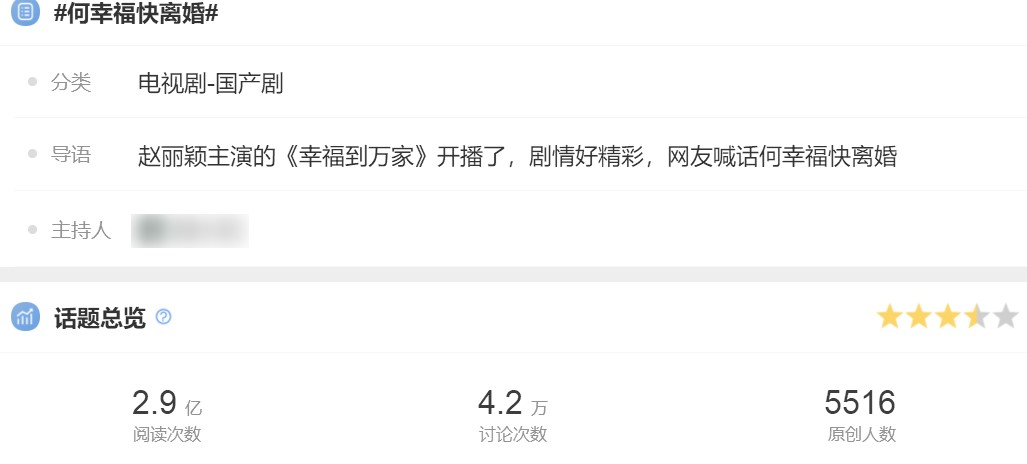
#HE Happiness Quick Divorce# It was once very popular
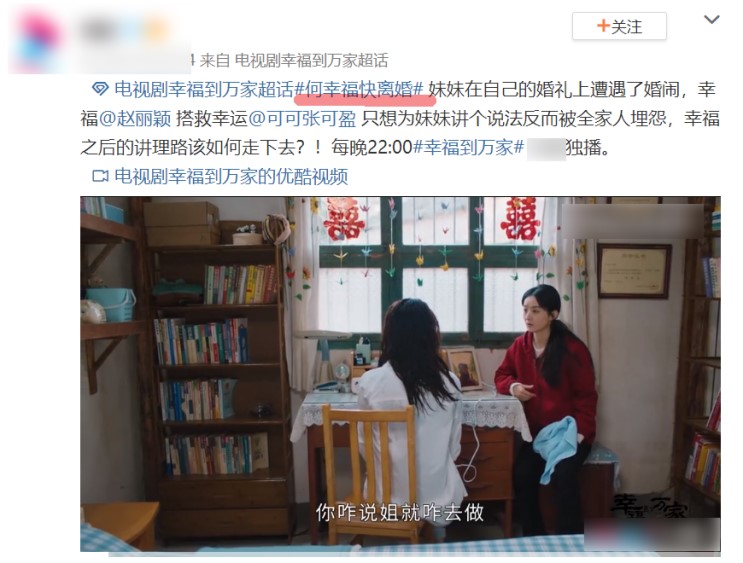
It's surprising that the broadcast platform is also so publicized
Frankly speaking, this kind of public opinion is quite worrying. It is another epitome of the "Three Views Party"'s involvement in film and television creation. That is, we can only accept a heroine who is particularly "feminist" as soon as he appears, and we can only accept a hero who is perfect, flawless, and fully respects women as soon as he appears. If it wasn't, we'd label them "feudal", half-pissed off because the heroine wasn't divorced.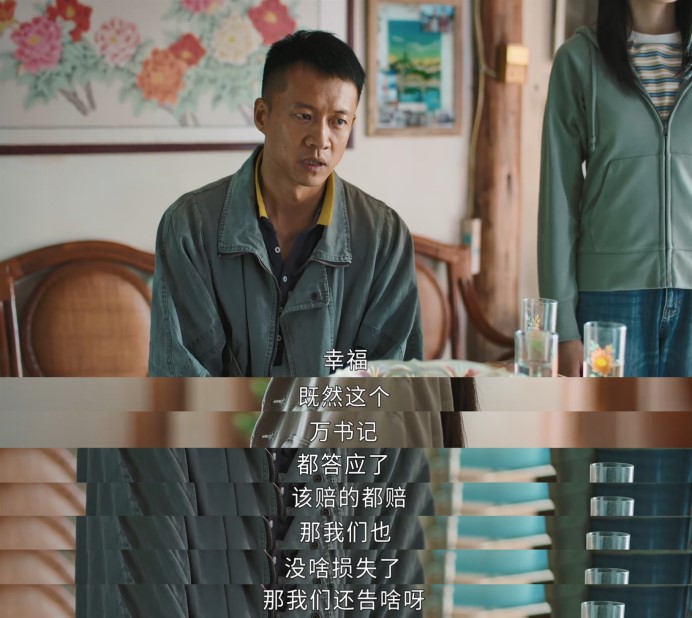
He Xingfu's husband Wang Qinglai (played by Tang Zeng) is "cowardly"
But from another point of view, the episode does not conform to the logic of "cool drama", but it conforms to the logic of realism and the logic of character growth. Although the series has endowed He Xing with various advantages from the very beginning, such as her diligence, kindness, tenacity, bravery, justice, and a basic concept of right and wrong; but the screenwriter did not "pull her hair and leave the earth", that is, she did not ignore one. Basic facts: He Xingfu is a girl who lives in the countryside and dropped out of junior high school. At the beginning, many of her ideas were still very "traditional". Faced with all the demands of a male-dominated society for women, she almost accepted everything.For example, she married Wang Qinglai after a blind date, based on very pragmatic considerations: Wang Qinglai was good to her, neither smoking nor gambling, and Wanjiazhuang was also a wealthy village. Her eyes flashed with admiration for the free love of her college student sister, but she quickly dismissed it, she knew she had to accept her fate.
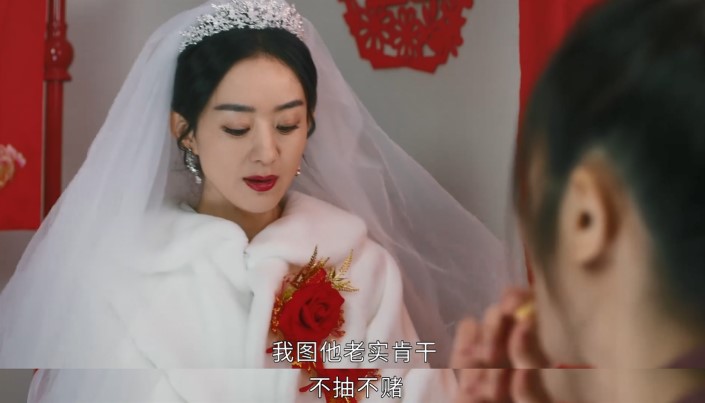
He Xingfu's reason for marriage is very pragmatic
When her sister was molested during a marriage, her husband's family did not stand up for her, and her husband behaved cowardly. She could understand the thoughts of her husband's family and never thought of divorce. Even when the matchmaker "threatened" to divorce and asked her to give up her claim, her response was, "If the Wang family doesn't want me as a daughter-in-law because of this, I will admit it." The logic of this sentence is "My husband's family doesn't want me", which is a kind of "punishment"; "I admit it", I am willing to accept the "price". He Xingfu subconsciously still thinks that once she gets married, she belongs to her husband's family; she also knows that divorce in the countryside is a big deal, and it is not a "good thing" for women, so she doesn't want to go to the stage of divorce.After returning to her mother-in-law's house, even if the sister-in-law didn't like her and picked on her in various ways, when the sister-in-law said that she was going to study for the exam, she said "sister-in-law does housework, and sister-in-law supports you". She regards housework as a daughter-in-law's responsibility, and she doesn't think "reading" is a married woman's right.
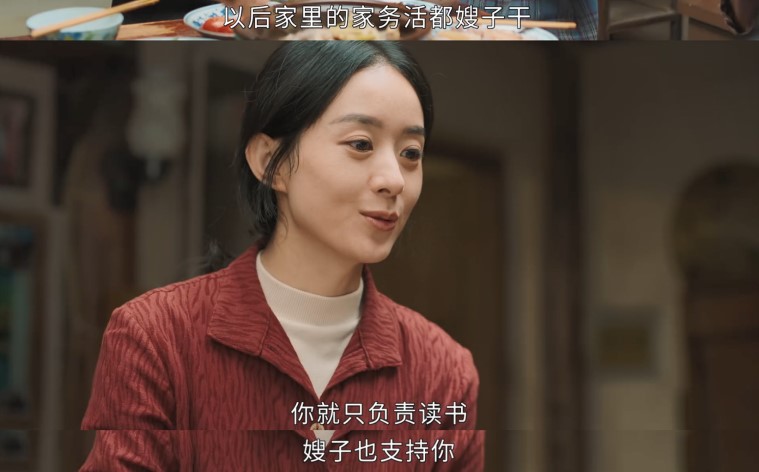
He Xingfu doesn't think he has the right to study
After she was pregnant, her husband's family was happy, but every time she was carrying "the seed of the old Wang's family" in her belly. He Xingfu did not express any discomfort to such a statement.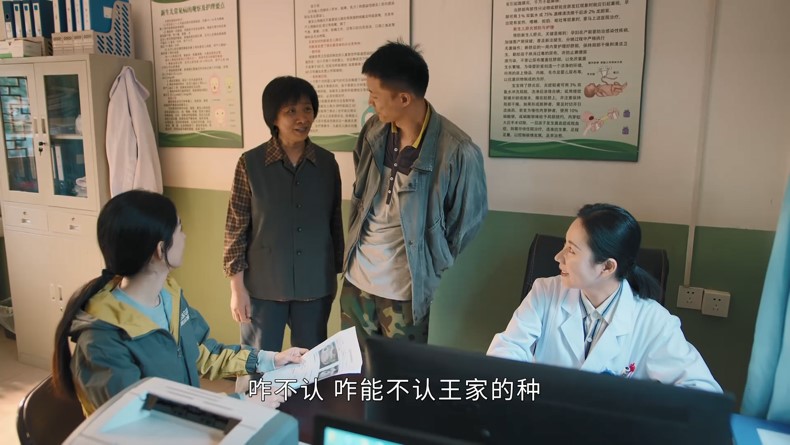
The mother-in-law said many times "the seed of the king's family"
After the greenhouse planting accident and her husband's lower body were kicked and injured, her father-in-law repeatedly poured cold water on her, accusing her that she should not be fooling around. I also didn't see He Xingfu's counterattack against the father-in-law...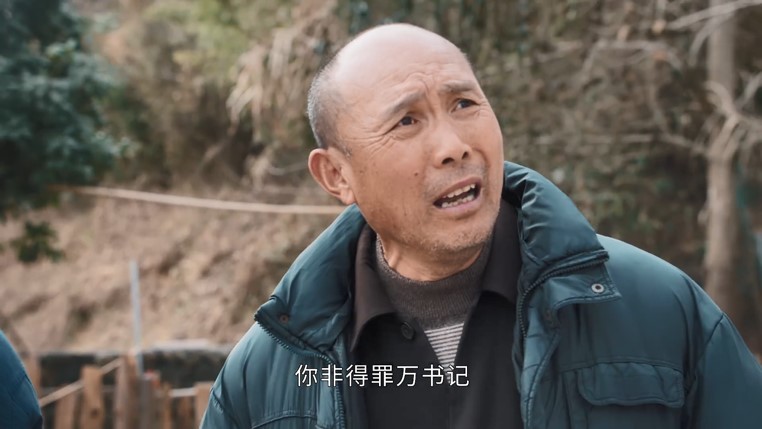
He Xingfu's father-in-law spoke coldly at He Xingfu's house
These episodes made some viewers watch "Lai Qi" and think that He Xingfu was deeply persecuted without knowing it. But this just gives the audience a deeper and heavier alert: you see, a rural woman like He Xingfu, who is so capable, sensible, and almost perfect, is also trapped in the rural order and patriarchal society. This mechanism has terrifying strangulation power, and it has disciplined countless women who were once rebellious and made them part of the patriarchal order.This is clearly reflected in He Xingfu's mother-in-law Guizhi (played by Chi Peng) and sister-in-law Xiuyu (played by Lin Siyi).
When she was young, Guizhi was another He Xingfu. When she first got married, she was also very sharp, but she suffered a lot because of it. Over time, her sharpness gradually faded away. On the one hand, she was very happy that her daughter-in-law was a tough person, not as stubborn as the men of the Wang family; but she still persuaded He Xingfu to compromise. Whether it's He Xingfu's sister being molested, or her son's lower body being kicked and injured by the village party secretary, the logic of the mother-in-law is that everyone is to be bullied, "either by this bully or by that". She thinks that women have to endure, and when they train their children to be "big officials" in the future, no one will bully them.
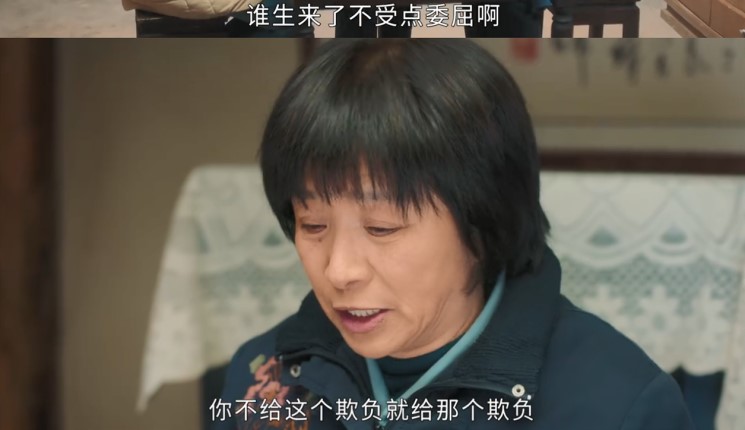
Mother-in-law's edges and corners have been smoothed out
Sister-in-law Xiuyu is also a victim of the patriarchal society. For example, the father thinks she is a girl, what kind of books should she read, and she should get married quickly; the mother also clearly said that the money Xiuyu earns must be used for the marriage of the two brothers... Xiuyu once expressed this by running away from home protest. But she still didn't have the courage to escape this structure - after all, she worked in Wanjia Group. So when her brother was kicked and injured, she persuaded He Xingfu to leave things alone. He Xingfu felt unbelievable, the old man thought so how could Xiuyu think so at a young age. But Xiuyu said: "Wanjiazhuang is like this, others can pass, what can we not pass?"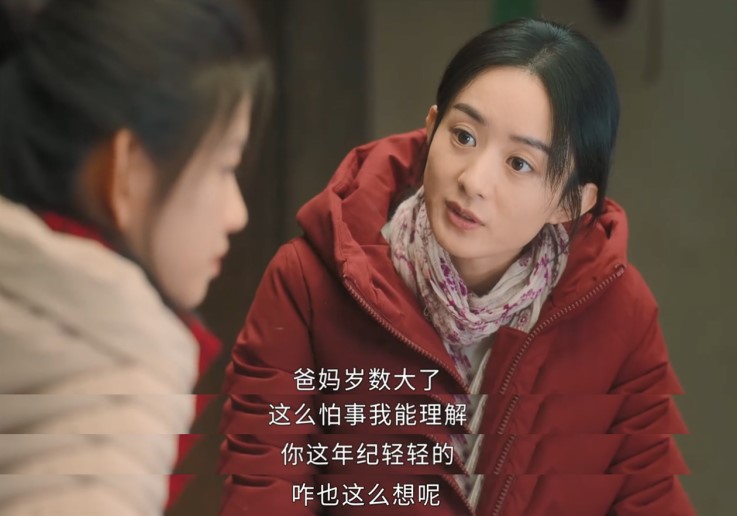
He Xingfu criticizes sister-in-law
Compared with the movie, "Happiness to Ten Thousand Homes" has a longer length. It shows how the patriarchal system domesticates, brainwashes and suppresses women through rich group portraits of women. It seems that the parents are short-lived, but in fact they are dripping with blood.Of course, the tone of the show is still upbeat and positive, because it creates a different heroine, He Xingfu, who doesn't compromise with this mechanism. But her resistance at the beginning was not because she had any distinct female consciousness - her limited education level, she did not understand those female theories at all, she relied on the simplest sense of good and evil, right and wrong, and sense of justice. The source of her persistence and courage.
It was not until later, when He Xingxing went to study in a law firm, that she was truly armed with legal knowledge and theoretical knowledge. Those ignorant senses of resistance have become more distinct, more powerful, and more guiding feminist concepts.
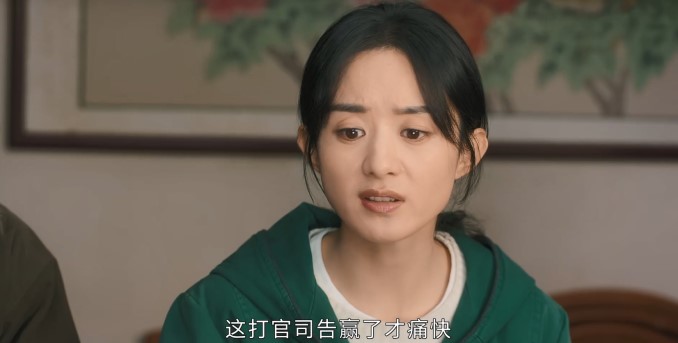
What happiness needs the arm of theoretical knowledge
"Whenever you want to criticize others, you have to remember that not everyone in this world has your superior conditions." Nowadays, those who have the right to speak on social media are mostly living in the city and educated For those who are not low-level, have awakened female consciousness, and have a certain spending power, we are increasingly unable to tolerate a film and television drama with a heroine who is not perfect at the beginning. But what everyone ignores is that not all women have the conditions you have, not that she immediately got the script of the heroine as soon as she got divorced, and her life has been reversed since then. They live in strict shackles and suffer enormous pressure and pain every time they break free; it's all too easy to shout slogans, but it's never an easy task to get someone to make a little positive change in a rigid environment. easy thing.So, don't worry about whether He Xingfu will get divorced and when it will get divorced, let alone urge her to get divorced quickly, and scold her for not getting a divorce. On the contrary, we should give them more practical help and support like Guan Tao. When they are truly independent and grown, they will make decisions about their own lives.